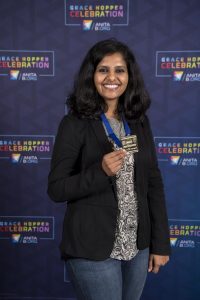Niveditha Kalavakonda is a hard-working, innovative graduate student and the past month is evidence of this. The Electrical & Computer Engineering Ph.D. student won first place in the Grace Hopper Celebration in the Association for Computing Machinery (ACM) Student Research Competition two weeks ago and two first place awards in the overall graduate category at the poster session at the 2018 ACM Tapia conference the week before.
Her win at Grace Hopper means she will soon compete in the grand finals in the ACM Student Research Competition for her work in robotics and computer vision. Her research topic, “robotic and neurosurgical instrument segmentation for development of intelligent surgical assistant,” will help track surgical instruments autonomously during procedures and can be used for collaborative robotics. Her award-winning topic at ACM Tapia was on “isosurface visualization using augmented reality for improving tumor resection outcomes.”
Kalavakonda has been interested in these research areas for quite some time. She said the whole idea of working on a problem and finding a solution that has the potential to save lives and be more cost effective, is very exciting to her. She hopes to have an impact in this area so that people in her home country of India can have more life-saving surgeries.
She took a year off between her undergraduate and graduate education to get more research lab experience, something she said her undergraduate education lacked. That lab inadvertently brought her to Seattle.
“When I was working in the lab I read a lot of papers by ECE professor Blake Hannaford and liked what his lab was going. I only applied to UW for grad school because I wanted to work with him,” she said.
Kalavakonda’s decision to get more experience in has helped her graduate career both in terms of research and building connections in her field.
“Nivi is very socially engaged and she is great at the networking aspects of a research career,” Blake Hannaford, Kalavakonda’s professor and graduate adviser said. “Even as a grad student she has developed many global connections at events like prestigious research summer schools on Computer Vision and Artificial Intelligence.”
Kalavakonda has said that the conferences were beneficial because she’s gotten a lot of helpful feedback on her research and encourages more female electrical & computer engineering students to attend Grace Hopper, which is the world’s largest gathering of women technologists.
Her adviser agrees that researchers need to attend conferences.
“It’s important to connect new research ideas with the personalities of the researchers themselves to judge the quality of the new ideas and through interactions to get a sense beyond what a written publication can convey,” he said. “For example, with what degree of confidence does an author answer questions about some research? This is why physically attending conferences is bigger than ever in the age of internet.”
After attending the two recent conferences and presenting her work to people with a diverse array of backgrounds, Kalavakonda is starting the autumn quarter with more ideas and new opportunities for collaboration.


